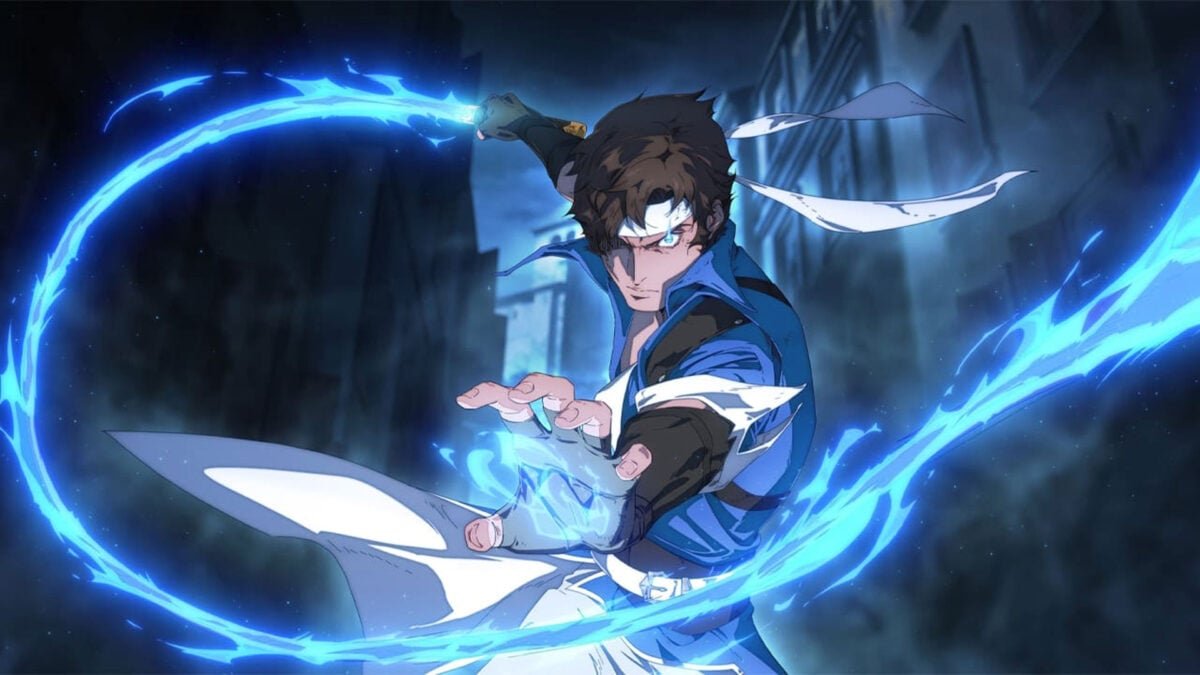I was probably as excited as anyone when Castlevania: Nocturne was announced. I’ve spoken many times about my love for the Castlevania franchise, mostly on the Pixels and Ink podcast and until Konami decides to start making good games again, Netflix was the only source I could trust for good Castlevania content.
I loved the first Castlevania Netflix series more than I’ve loved anything Netflix has produced. I must have watched the first four episodes 100 times, and each subsequent season only got progressively better. My hopes were high for the next adaptation of one of the Castlevania games, and I have to admit…I was left a bit wanting.
Being based on Castlevania: Rondo of Blood, the story follows Richter Belmont as he combats the forces of evil in France during the French Revolution. It’s a fairly loose adaptation—much looser than its predecessor, which still based its central plot on Castlevania III: Dracula’s Curse—and certain plot elements from the game have been radically shifted.
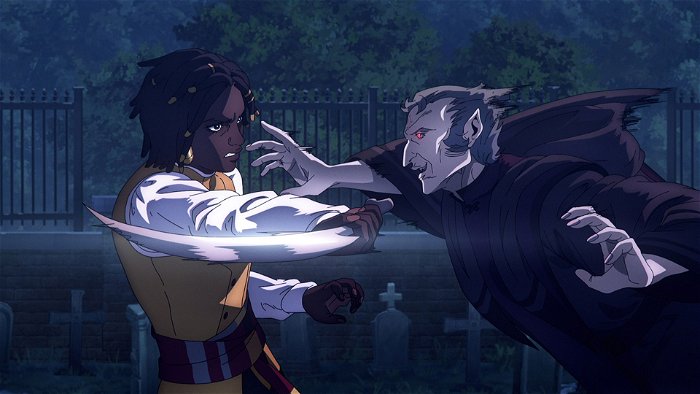
It leans a bit more into the history of the period, the aristocracy aligned themselves with vampires in order to subjugate and control the peasantry. On top of this, the vampires keep heralding the coming of a “Vampire Messiah,” who will bring about an eternal age of darkness. Richter and Maria are common allies of the Revolution who not only want to free the people from the ruling class but the vampires who are literally sucking the life out of the people.
It’s not a bad way to reimagine the game’s story, however, it begins what is a collection of issues I have that make the show a lot less compelling than its predecessor. Because of where it takes place in history, the show has no choice but to make almost all the vampires cartoonishly evil, while the majority of humans are helpless victims or good but compromised by fate. As such, the story falls a bit flat for me, since the bulk of its characters lack the nuance that they did in the first series.
It’s something I think the first Castlevania show did a lot better. Its vampires were antagonists and not straight-up villains. Characters like Carmilla and Issac were given a great degree of depth and pathos that made their ambitions understandable. Castlevania: Nocturne’s vampires basically want to drink all the humans because it’s either fun or the right thing to do.
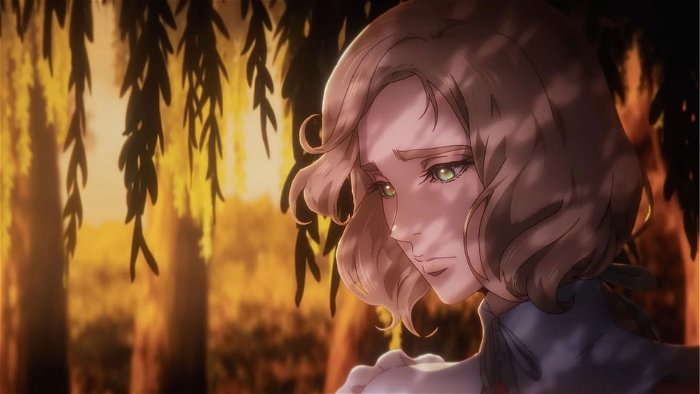
This extends to the protagonists as well, who I never felt were anywhere as deep or likable as the first Castlevania series. Richter is mostly fine—snarky and over-confident while still trying to battle his inner demons. Maria comes off a bit too preachy and is nowhere near as likable as Sypha was. Annette is given the most amount of backstory and depth—now being a former slave who escaped her vampire-controlled plantation, and was taught to wield elemental magic—however her relationship to Richter is kind of all over the place emotionally, and when they showed a scene were it seemed like they were about to kiss I found myself wondering, “where did that come from?”
Maybe this is just coming from a reverence for the first series, but I feel like in that one you genuinely saw Trevor and Sypha forming a connection, even through their differences and bickering. Alucard’s emptiness was informed by the loss of his mother and the impossible weight of his need to kill his father. There was just a lot more going on with the characters who were all somewhat at odds but managed to form a bond. With Castlevania: Nocturne, it feels like the bond is supposed to be there, and you’re kind of just supposed to know it.
Then, of course, there’s the Dracula-shaped hole in the series. Given how the first Castlevania series ended, I was genuinely curious to see how a series set after the events of the first game – or at least after Castlevania III in the timeline—would handle the character of Dracula, and Castlevania: Nocturne’s approach seemed to be… not to. Which is fine in a way, but so much of Castlevania’s DNA is wrapped around Dracula and his connection to the Belmonts – and the world, really – that it just seems wrong to leave him out.
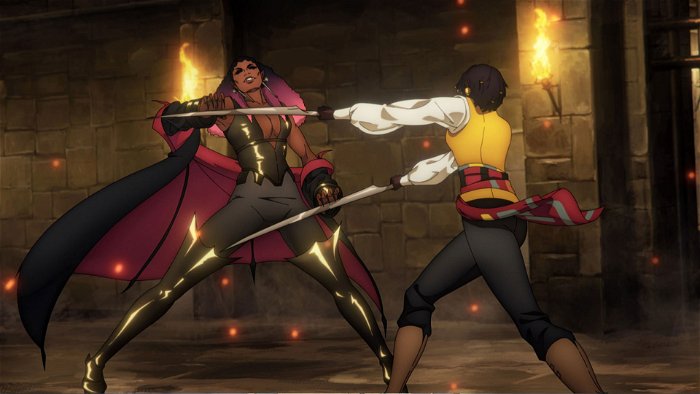
Dracula’s tragedy and loss are really what made his character so compelling in the first series, and I think there were ways that could have extended into Castlevania: Nocturne, particularly in relation to Richter who, himself, grapples with the loss of his mother which informs a lot of his character growth. However, considering how the last episode of Castlevania: Nocturne ends, the show may be leaving the door open for a future confrontation.
Visually, the show remains incredible with a brilliant use of colour that is more in line with not only Richter’s visual design but the game the show is derived from. The remarkable linework and impeccable animation for fight scenes and elemental attacks is still intact, although some of the fight scenes are a little busy, and nowhere near as crisp as its predecessor. The score is equally as brilliant throughout, utilizing a lot of solo opera singing—usually through the character of Edouard—to punctuate the tragedy of most fights. And special mention has to be made for the use of Castlevania: Rondo of Blood’s “Bloodlines” for the scene where Richter unlocks his true potential.
I always wished the original series used more music from the games, as Castlevania has, arguably, one of the greatest soundtracks in videogame history, and I never quite understood why they used “Bloody Tears” for the scene when they begin their assault on Dracula’s Castle since that was from Castlevania II: Simon’s Quest—I would’ve gone with “Beginning” but that’s just me. So I was genuinely happy that they used a theme that was not only from the game the series was adapted from but was meaningful to the character himself.
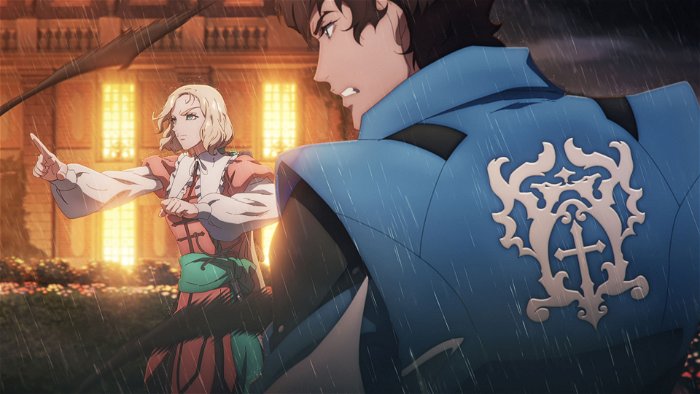
Castlevania: Nocturne is by no means a bad show, despite my complaints. While I may not think it’s as strong as its predecessor, it’s only one season in and may still have a lot of room to grow. I hope, much like the first series, its second season may dive a bit deeper into its characters, particularly the vampires, and make them more complex, well-rounded characters. Nevertheless, Castlevania: Nocturne is more, solid Castlevania content and a perfect watch for the spookiest month of the year.
